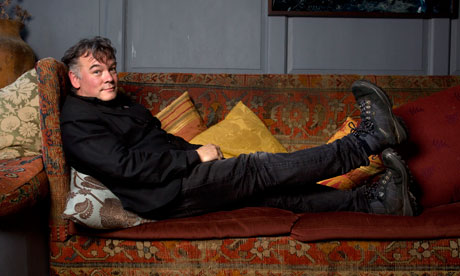
14 Aug 2010 20:54:17
This story is about one popular and the most enigmatic comedians Stewart Lee. He is one of the best in his business.
His slow, measured voice, his sulky, hectoring manner, and his relentlessly logical fury make him a compelling stand-up. In an industry where blandness is often rewarded above all else, Stewart Lee is an oasis of intellect and originality. He is unlikely to appear at the Royal Variety Performance any time soon (unless the Queen expresses an interest in material about the professional ethics of Joe Pasquale), and nor should he. It may be bad for his bank balance, but Lee's audience see him as the king of counter-culture. If he sold out, became smiley and easygoing, their sad hearts would surely break.
His new work named “How I Escaped My Certain Fate: The Life and Deaths of a Stand-up Comedian” will estimate at one's true worth people who loves comedy very much. He is analytical, critical and perfectly willing to say when he finds himself proud of something he wrote, or occasionally ashamed. It is a fascinating insight into the process of creating comedy, and making months of work feel like a fresh, spontaneous show each night.
But the risk with trying to record a stand-up performance in any medium is that it loses some of what makes it good. Stand-up – at the risk of sounding like a total ponce – is an ephemeral experience that occupies the space between comic and audience. Every gig is unique. The venue, the start-time, even the day of the week make a huge difference to the experience: a complicated show needs a focused audience, and those tend to come on week-nights.
So although it's a pleasure to read the transcripts for Lee's shows, the experience is frustrating, because they cry out to be performed. It's something he knows, too. In a footnote on a routine about Richard Littlejohn, he writes: "This doesn't work on the page, and ideally, my ambition is to get to the point where none of my stand-up works on the page. I don't think stand-up should really work on the page, so the very existence of this book is an indication of my ultimate failure as a comedian." Quite the reverse: the book makes you long to hear rather than read him.
His slow, measured voice, his sulky, hectoring manner, and his relentlessly logical fury make him a compelling stand-up. In an industry where blandness is often rewarded above all else, Stewart Lee is an oasis of intellect and originality. He is unlikely to appear at the Royal Variety Performance any time soon (unless the Queen expresses an interest in material about the professional ethics of Joe Pasquale), and nor should he. It may be bad for his bank balance, but Lee's audience see him as the king of counter-culture. If he sold out, became smiley and easygoing, their sad hearts would surely break.
His new work named “How I Escaped My Certain Fate: The Life and Deaths of a Stand-up Comedian” will estimate at one's true worth people who loves comedy very much. He is analytical, critical and perfectly willing to say when he finds himself proud of something he wrote, or occasionally ashamed. It is a fascinating insight into the process of creating comedy, and making months of work feel like a fresh, spontaneous show each night.
But the risk with trying to record a stand-up performance in any medium is that it loses some of what makes it good. Stand-up – at the risk of sounding like a total ponce – is an ephemeral experience that occupies the space between comic and audience. Every gig is unique. The venue, the start-time, even the day of the week make a huge difference to the experience: a complicated show needs a focused audience, and those tend to come on week-nights.
So although it's a pleasure to read the transcripts for Lee's shows, the experience is frustrating, because they cry out to be performed. It's something he knows, too. In a footnote on a routine about Richard Littlejohn, he writes: "This doesn't work on the page, and ideally, my ambition is to get to the point where none of my stand-up works on the page. I don't think stand-up should really work on the page, so the very existence of this book is an indication of my ultimate failure as a comedian." Quite the reverse: the book makes you long to hear rather than read him.

